
As a multicultural country, Singapore’s immigration policy, while maintaining a balanced demographic structure (about70% to 80%Chinese-dominated), is particularly stringent in screening applicants of Indian origin:
The quota forIndians to apply forPRis limited, the pass rate is significantly lower than that of the group, andalthoughthe ONE Pass, as a top talent pass, has a very high threshold (a monthly salary ofS$30,000), ethnic Indian applicants are still required to additionally prove their willingness to put down roots in the long term and integrate into the community.
However,inMay2025, anIndian-origin executive withONE Passwas successfully approved forPRwith his entire family of three, making it an exemplary case where policy rigor and talent inclusion go hand in hand.
1、Top Expertise Platform:ONE PassLays a Solid Foundation
The main applicant in this case was born in India, but with Australian citizenship and background as a regional technical management executive, hewas grantedONE Passin 2023with a monthly salary of more thanSGD30,000, and this status becamethe “golden springboard” forhisPRapplication.
It is worth noting that Indian applicants often face a higher risk of rejection due to nationality quota restrictions, butONE Passholders can break through some of the hidden barriers due to their “top talent” label.
In this case, the applicanthighlighted his irreplaceability to the Singapore economyby emphasizinghis long-term leadership rolein a well-known multinational company (with a market capitalization of more thanUS$500 million), clearingthe wayfor a subsequentPRapplication.
2. Holistic planning for families: breaking the core challenge of the “will to take root”
Indian familiesare often rejected forPRdue to “insufficient long-term commitment”, but in this case, the “simultaneous application of three members of the family+10-year landing plan” solved the problem.
The principal applicanthas been working in Singaporesince2013and has accumulated over 10 years of local work record; his spouse and children’s documents have detailed plans for their children’s education path, family home ownership timeline and community involvement plans, and emphasize the determination of the “second generation to put down roots in Singapore”.
This strategy effectively responds toICA‘s concerns about whether Indian applicants are “truly rooted”.
3. Contribution to excellence in qualification: hard power recognition across nationalities
The applicants have strong backgrounds: both husband and wife hold Master’s Degrees and have solid professional backgrounds; the lead applicant has taken a leadership role in technical management and has made significant contributions to regional business development. His Australian nationality (born in India) also reflects the diversity of his background.
ICA‘s approval is based on the high recognition of their high skill levels, consistently high income, significant professional contributions and the family’s genuine commitment and willingness to integrate into Singapore’s long-term development.
Although Indian applicants often face tougher salary criteria (e.g.S$6,000forregularEPs), in this case, the couple’s dual master’s degree background, the scarcity of technical leadership positions for the lead applicant, and the high tax contribution of the family’s annual income were all key plus points.
TheICAapproval shows that the disadvantage of nationality background can be crossed when the professional value is sufficiently prominent.

Picture/Customer successfully got PR, stolen picture will be punished!
4. Key success factors: differentiation strategies for Indian applicants
This case clearly demonstratesthe core logic ofSingapore’sPRapproval process: exceptional personal strengths must be combined with a deep commitment to the long-term development of Singapore.ONE Passserves as a “knock on the door” for top talent, proving the applicant’s economic value and industry status.
The key toobtainingPRis to convincetheICAexaminerson all fronts through a long and stable local work record (more than 10 years), the willingness to put down roots as reflected in the family master plan (especially the Next Generation Integration Program), and the potential for sustained contribution to the community.
This case reveals the core breakthrough of the Indian family:
ONE Passas a “golden ticket”: direct exemption from some competitive quota restrictions;
Ten-year planning replaces short-term commitments: demonstrate intergenerational rootedness with children’s education, homeownership programs, etc;
Salary and industry advantages: The field of technology management fits the needs of Singapore’s industrial upgrading.
The successful approval of this family of three is not only an important milestone in the applicants’ career and family planning, but also a vivid reflection of Singapore’s continued openness to top talent and its rigorous and pragmatic immigration policy core:
Attract talented people who truly identify with and are willing to contribute to Singapore’s development in the long term.
Fortop professionalswith aONE Passor equivalent, a clear demonstration of personal excellence and a long-term commitment to local integration is the key to unlockingthe door toPRin Singapore.
Note:ReferencesfromICASingapore,MOM, comprehensive customer oral collation, case data has been authorized by the customer, the core information desensitized processing, reproduced must indicate the source.

